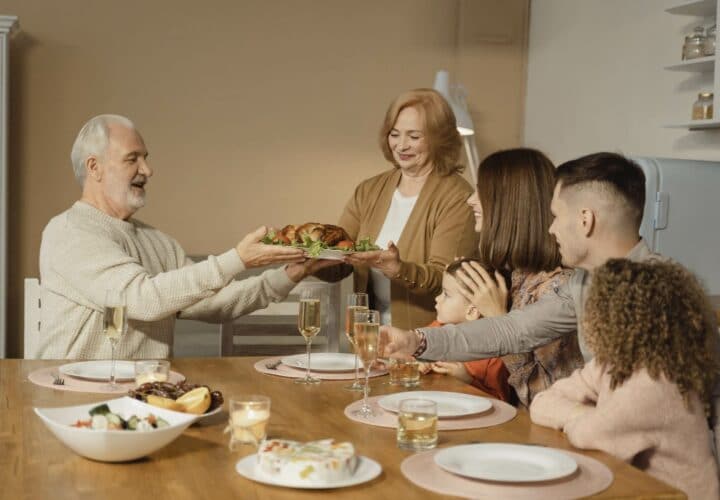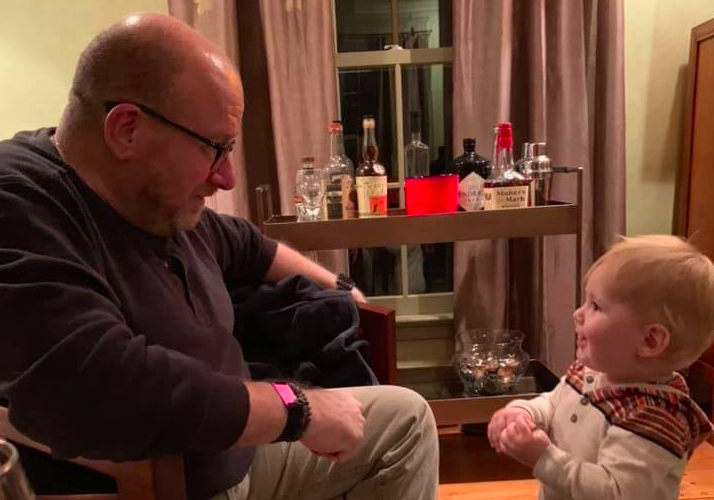This Thanksgiving and throughout the holiday season, make your family gatherings dementia-friendly. A dementia care expert offers some evergreen advice.
As we kick off the holiday season with Thanksgiving, we revisit past wisdom from caregiving consultant Linda Jenkins about how to celebrate the holidays with family members who are living with dementia.
1. Ask for help when you need it.
Gatherings may be smaller this year — experts urge against gathering beyond the immediate household — but some families will still gather, and holidays with family can be stressful, the events of 2020 aside.
“Now, factor in being a caregiver to a family member with Alzheimer’s disease,” Jenkins wrote for Being Patient in 2018. “Caregiving is a stressful role in and of itself; throwing in entertaining friends and family during the holidays can become more stressful causing the caregiver to have less patience.”
To spare the sanity of the caregiver and keep the mood merry and bright for guests, Jenkins said asking for help is key — help running errands, setting the table, and entertaining, etcetera. “When you ask for help it doesn’t mean you’re weak and can’t handle hosting celebrations,” she said. “By enlisting help wherever you can it actually demonstrates how organized you are about getting things done in an efficient way.”
2. Keep things intimate.
Jenkins advised that if the person with Alzheimer’s lives with you, or will be visiting for a short time, don’t invite a crowd — keep the guest list small. A more intimate gathering, she said, “allows the person with Alzheimer’s to remain calm since loud voices, chaos and people talking over one another can create anxiety for a person with dementia.”
This goes for the playlist, too. While music can have very therapeutic effects for older adults with Alzheimer’s and dementia — particularly old music they remember from past times in their lives — music that’s too loud will have the opposite effect.
“Loud noises can be upsetting to your loved one,” Jenkins said. “Try a selection of more classic soft carols playing in the background.”
3. Be attentive.
“Be considerate of your loved one with Alzheimer’s by paying close attention if they are getting tired and need to lie down,” Jenkins said. “In my experience, they won’t tell you they are getting tired, but anyone with dementia or Alzheimer’s tires easily and can become agitated if they start feeling this way.”
4. Prepare other family members.
If families do convene this year, experts suggest, among other precautions, getting testing twice a few days apart for COVID while quarantining prior to seeing loved ones. In a year that pandemic safety measures didn’t play into family holiday plans, Jenkins suggested reaching out to other family members in advance of get-togethers to help prepare visitors for how to best interact with and engage a loved one with dementia.
“You might notice how family and friends are doing their best to interact with your loved one so they don’t feel left out. If they haven’t been around this person in a long time remind them to speak slowly and in a calm voice, that way your loved one will be able to understand them and try to process what is being said,” Jenkins advised.
While she recommended having a conversation with family member before the celebration, she offered the reminder: “Whatever you do, don’t discuss the Alzheimer’s patient’s situation in front of them to other people. Even though you might think they don’t understand what’s being said, they know you’re talking about them.”
5. For family members who aren’t able to gather in person, set aside special time to connect from afar.
“Spending the holidays with that family member provides an opportunity for other family members to show how much they still love and care about them,” Jenkins wrote.
During the novel coronavirus pandemic, some families have found ways to share the holidays over video call platforms like Zoom, or with letters, pre-recorded video messages, and other digital means. “This time together creates a new and different kind of bond with the person who has Alzheimer’s. These are keepsake memories.”
6. Looking for more specific advice?
Check out these specific steps for making a holiday gathering dementia-inclusive.
Linda Jenkins writes about her experience with Alzheimer’s on her blog.




